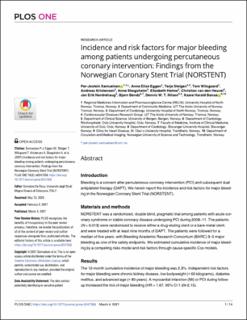Incidence and risk factors for major bleeding among patients undergoing percutaneous coronary intervention: Findings from the Norwegian Coronary Stent Trial (NORSTENT)
Samuelsen, Per-Jostein; Eggen, Anne Elise; Steigen, Terje; Wilsgaard, Tom; Kristensen, Andreas; Skogsholm, Anne; Holme, Elizabeth; van den Heuvel, Christian; Nordrehaug, Jan Erik; Bendz, Bjørn; Nilsen, Dennis W.T.; Bønaa, Kaare Harald
Journal article, Peer reviewed
Published version

Åpne
Permanent lenke
https://hdl.handle.net/11250/2767725Utgivelsesdato
2021Metadata
Vis full innførselSamlinger
- Department of Clinical Science [2395]
- Registrations from Cristin [10402]
Sammendrag
Introduction
Bleeding is a concern after percutaneous coronary intervention (PCI) and subsequent dual antiplatelet therapy (DAPT). We herein report the incidence and risk factors for major bleeding in the Norwegian Coronary Stent Trial (NORSTENT).
Materials and methods
NORSTENT was a randomized, double blind, pragmatic trial among patients with acute coronary syndrome or stable coronary disease undergoing PCI during 2008–11. The patients (N = 9,013) were randomized to receive either a drug-eluting stent or a bare-metal stent, and were treated with at least nine months of DAPT. The patients were followed for a median of five years, with Bleeding Academic Research Consortium (BARC) 3–5 major bleeding as one of the safety endpoints. We estimated cumulative incidence of major bleeding by a competing risks model and risk factors through cause-specific Cox models.
Results
The 12-month cumulative incidence of major bleeding was 2.3%. Independent risk factors for major bleeding were chronic kidney disease, low bodyweight (< 60 kilograms), diabetes mellitus, and advanced age (> 80 years). A myocardial infarction (MI) or PCI during follow-up increased the risk of major bleeding (HR = 1.67, 95% CI 1-29-2.15).
Conclusions
The 12-month cumulative incidence of major bleeding in NORSTENT was higher than reported in previous, explanatory trials. This analysis strengthens the role of chronic kidney disease, advanced age, and low bodyweight as risk factors for major bleeding among patients receiving DAPT after PCI. The presence of diabetes mellitus or recurrent MI among patients is furthermore a signal of increased bleeding risk.
